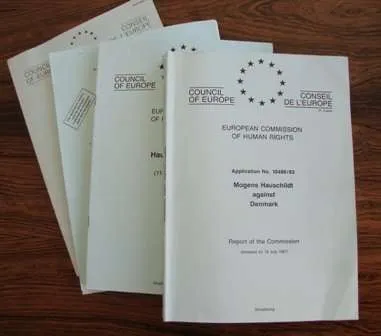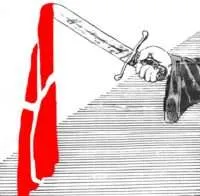Something is rotten in the state of Denmark
That “Something is rotten in the state of Denmark” surely was obvious, at least it should have been for everyone. Bagmandspolitiet was able to instigate and create their own case, use the media as a propaganda machine to “sell” a story of lies to the public and demonise me, the companies and our clients. The initial arrest, based on alleged tax evasion, had no foundation and I was never charged with tax evasions.
They charged me with fraud, ignoring the facts, that we had a legal contract with all our clients which clearly stated our business conditions and terms. So where there was a clear legal business contract, agreed by several lawyers advising the company, a contract which did not provide any obligation on me as the companies managing director to buy or hedge according to the sale of the companies, Bagmandspolitiet was able to just blatantly disregard this and get both courts, judge Claus Larsen in the lower court and later the High Court judges, to follow and rubberstamp their abuse of power.
Both Judge Claus Larsen and the high court judges took the opposite view to the Swedish law professor’s legal opinions and judged that such obligations did exist, reading the same contract – they had to – in order to justify everything.
Without this liability in the contract with our clients, the Special Prosecution had no case against me. They simply had no other choice. White had to be black, just think of the consequences if I was declared not guilty. This could simply not be tolerated by the authorities after more than four years in restrictive pre-trial detention and solitary confinement.
“All the clients’ losses were created by the closing of the companies and the action by the Special Prosecution, they are responsible for all the clients economic suffering thereafter.”
– Advocate John Korsø-Jensen
Hundreds of investors had lost large amounts due entirely to the actions of the Danish authorities. My whole case cost tens of millions for the Danish taxpayers with members of Bagmandspolitiet travelling all over the world.
The fact that Bagmandspolitiet and the Danish authorities had no choice as to their “interpretation” of the companies (SCE) standard business terms with regards to these deferred margin sales of precious metal and that that interpretation had had nothing to do with the law, was abundantly clear.
When I instructed our business terms to be legally drafted a few years earlier, it was a pre-requisite that SCE did not have a legal obligation to hedge or buy at any time, since this would have prevented us from making a big profit when the opportunity came. Such an opportunity did come along in the months before and after my arrest.
It is a fact that SCE acted as principal in all transaction with clients and had at no time any obligation to balance its books (match the sale by buying), nor buy precious metal or any other commodities according to the sales on margin. Neither did we have any obligations with regards to our stock. We did have an obligation to deliver such purchases when the clients gave us notice and we then had up to six weeks to deliver after the clients had paid all the outstanding amounts (principal, interest and sales tax).
Finn Meilby (Chief of Bagmandspolitiet) told BT tabloid newspaper on the 31st January 1980:
“It is our impression that the money has been taken out of the country”. “That the arrest of Mogens Hauschildt only concerns the alleged tax evasions”
All the clients who had left precious metals with the companies (uncollected) could, by giving us forty-eight hours’, notice collect their precious metal or coins.
Most precious metal and commodity companies are, at any given time, short or long in the market. This is really how they make money; selling high and buying low. Knowing that the market in precious metals would crash, no professional trader would go in and buy with the view of selling at a higher price.
When a commodity like precious metal doubles and trebles in price, dealers will always await a reaction (the so-called technical reaction) before they would consider going into the market and buying.
After September 1979, most professional traders expected such reaction – and quite rightly. The floor brokers at Comex (New York Commodity Exchange) were short by more than seven thousand contracts of silver when I was arrested. These floor brokers had the power to change the rules of the game to their advantage; which they did.
With regards to the lies that SCE (the companies) were giving advice to clients, telling them when to buy and sell in the month prior to my arrest, we stopped sending out our SCE Market Report many months before the raid on the companies since we did not want to show any subjective advice.
We let the media do the talking, after all, the media (from television to newspapers), showed images of investors all over the world standing in long lines trying to buy gold and silver. The media did the selling for us and we just had to sit back and take orders from keen buyers who were greedy to buy gold, platinum and silver.
When I was interviewed by radio or on television I was careful not to tell people to buy precious metal, only making references to the many experts that had predicted higher prices in precious metals – which were, after all, a fact.
As to bankers giving advice, we have seen recently that respected investment banks such as Goldman Sachs told their clients to buy something when they, in fact, themselves were selling it; nothing wrong in that. Investment consideration can also relate to time if you want to take a short or long term view.
Many times I have sold something, even though I believe the price will go up in the long-term, with the view to buy it cheaper in the short-term. Moreover, no one has a crystal ball; this is how the investment industry operates.
My defence lawyer Korsø-Jensen, a respected business lawyer, said to the Court:
“All the clients losses were created by the closing of the companies and the actions by the Special Prosecution, they are responsible for all the clients economical suffering thereafter.” (Børsen 18th June 1981).
Until Bagmandspolitiet closed the companies and my pre-trial punishment in solitary confinement, the companies had fulfilled all their obligations. Moreover, my companies and I were all solvents.

I Wanted to Exposed the Misuse of Power
In fact the day before the judgment in the High Court I was interview by one of the tabloids. As the newspaper correctly reported I did not bother much about the fort coming judgment, I knew that they had no choice but to let me free, they had gone much too far and they knew it.
Having warned the authorities’ years before that Denmark would end up with a judgement against them at the European Court of Human Right, a BLACK SPOT on Denmark’s reputation, I knew – they, in reality, had lost, all these faceless grey people of injustice. I had the same feeling as the East Germans who stood on top of the Berlin wall 5 years later and looked into the faces of the East German Guard, they HAD LOST!!! And decency had won over abuse, misuse of power and dictatorship.
I even declared to the tabloid that if these abusers and misusers of power believed my case is finished, I told them “it will really first start now”.
Frankly, the next day when I walked out of the court, I felt that I should just get away from all this and these terrible years, I had no interest in ruining my life with all this negativity and so I did not do anything except what I had started in Strasbourg. The pain was too much and the scars too deep to open up, so therefore it has taken me 28 years until now.
A Few Questions to Ask
The question is: should the government be allowed to set about to commit an illegal act and allowed to cover this up afterwards?
All governments and their departments do commit acts which are against the current laws of the land. They also seem to be able to cover up such acts by “adjusting the law” and by making new laws and directives – always able to cover their tracks. However, all of these political elected and public civil servants always believe that they have the legitimacy to decide what is best.
We allow government and civil servant the right to “do what is best for us” like they have the moral and legitimate right, not forgetting the intelligence and know-how. In my own experience, we do allow this. I did run a “democratic” elected organisation and knew that when something comes up you just simply deal with it. The last thing you do is ask hundreds or thousands of people, you will simply not be able to act. If you have made a mistake, one tries to sweep it under the carpet or to justify it.
No doubt that the Danish government was “allowed” to decide that they had to take action against something which partly would affect the established banks, the National Bank’s directives and currency rules at the time. Moreover, this was a legitimate way for people to hide their black money and possibly to take these assets abroad without the control by the authorities since all the rules were not defined. Furthermore, since the fiscal authorities had not seen the consequence of tax laws as to investing in commodities, currencies and precious metals, they had to show that the arm of the revenue reaches out to every corner in the land.
Firstly, the authorities “should” try to play by the rules, which after all they themselves are responsible for.
So many hundreds of tax investigations and cases came about as a result of the closing of SCE. I have no difficulty in accepting the above; my difficulty is partly personal (for all the suffering my family and I had to go through) as well as on behalf of all the investors who lost out as a result of the authorities “illegal” action.
Secondly, when injustices have been done and exposed, at some point the government should admit to such and call a spade a spade. Practically, authorities do not always have the spine to do so, partly because it will always mean that they admit mistakes and individual civil servants with their power to dominate will not tolerate this since it always will affect their reputation which is worse for the politician and for their electability.
Advocate Folmer Reindel told the 17 Judges from 17 member countries of European Court of Human Rights in Strasbourg – September 1988:
“It is clear that the Danish authorities had, for a long time, the objective to close down Hauschildt’s successful and profitable business, irrespective that the companies acted correctly and within the Danish law.
From the first day of action against Hauschildt and his companies, it has been the objective of the Danish authorities, at any cost, to justify their illegal acts, including keeping Hauschildt in solitary confinement and pre-trial detention for more than four years as a hostage to justice.
The Danish authorities acted within total contempt of the Danish law and justice and the European Human Rights Convention.
Hauschildt and his companies became victims of the Danish State”
This is where the free press has a responsibility; the free media should give a guarantee for the citizen to the exposing of obvious injustices and wrongdoings by the government and their civil servants.
The Danish media failed miserably in this responsibility in my case. Instead of seeing through the authorities’ true intention, they went along as a lap dog and swallowed all the lies and misinformation that Bagmandspolitiet created to justify their actions. Moreover, the tabloid press livened up all the “stories” from false gold bars to black-market trading and even murder; all completely untrue.
As to the last, murder, this was even mentioned in the headlines the day after I walked free out of the High Court after more than four years of pre-trial detention. A story which was fabricated four years earlier and had no truth in it, only the big headlines.
It appears that the Danish press is more responsible today, well at least some of the press. I have read about all the mistakes that Bagmandspolitiet has done with regards to the case against Stein Bagger (Bagger-sagen).
As previously mentioned, we live in an age where even the German fiscal authorities saw it fit to pay criminals to steal computer disks from a Liechtenstein Bank and provide these criminals with a new identity and money.
The questions should be asked: how far should we allow authorities to go beyond the current law and take illegal steps without justifying themselves, even when they do this for the betterment of society?
In an interview with Berlingske Tidende in 1981, Finn Meilby, the chief of Bagmandspolitiet said that some “observations” can go on for years, others go fast.
“In the current case of the gold and silver speculations, Bagmandspolitiet worked hectically for thirty days. The market was so overheated that they got our interest and quickly received information confirming our suspicion of law breaking activities. We foresaw that large and small savers were running a risk – and hit”
They raided the companies for “open television” without any complaint – only a trump-up charge of alleged tax evasion.
This statement is directly in contrast to his police commissioner Mogens Kanding statement to the press a year earlier “That Bagmandspolitiet had been monitoring my companies for five years”. But these people lie all the time, so what?
In the same article, Finn Meilby proudly states their results of fifty-seven cases won and “only one” lost. One should ask how Bagmandspolitiet can be so successful and infallible. Only the prosecution in Russia, Iran or China today can show the same results.
Bagmandspolitiet is a complete hypocrisy
When Bagmandspolitiets first chief, Hervert Grell, left his office in 1978 he claimed to have said: “Bagmandspolitiet is complete hypocrisy”. I totally agree with him, but for different reasons than what Hervert Grell meant at the time of leaving and slamming the door.
There appeared to be a dramatic change in the way that Bagmandspolitiet go about doing their “work” in recent years.
First, I am the last one to judge any case, I certainly need to know the details, secondly, you can never trust the media, at least you have to read many different views and reporting to get some objectivity, nevertheless, all the media can be manipulated. Nevertheless, recent criminal cases in Denmark show that Bagmandspolitiet at least has some respect for the law and the individual.
The case of Stein Bagger can mildly be said to show a different treatment of people as to fraud and white-collar crimes in Denmark. Stein Bagger had committed a common fraud by creating false leasing agreements and defrauded the banks by over D.kr. 800 million. Despite admitting to fraud for more than this amount and with more than D.kr. 200 million still missing, he received a prison sentence of “only” seven years in June 2009, which he is serving in open prison with weekend home visits.
A common crime of fraud more than D.kr 800 million and money still missing, but Stein Bagger did not have to endure 1492 days in pre-trial incarceration. Moreover, Bagmandspolitiet argued in my case for a 12 years sentence. Stein Bagger will “only” serve 3,5 years prison term for a common crime stealing from the banks, whereas I was locked up in restrictive pre-trial detention for more than four years. So I must conclude that things have got better as to the way that Bagmandspolitiet goes about their business.
According to the Danish press, at the time of my case coming to the finishing of the trial in the lower court, it had cost more than D.kr. 20 million. One of my defence attorneys estimated that the case had cost more than D.kr. 40 million in total and of this money my defence received less than 2 %. Despite that, the tax authorities could recover some of this money from the hundreds of cases they had as a result of the closing of the companies (with access to the companies’ files). I maintain that Denmark lost far more than money.
Many Danes left Denmark in the period of 1980 – 1990 including many entrepreneurs – all Danes who could have contributed greatly to the Danish society. I was told that more than 20,000 Danes moved to the United Kingdom alone in the period of 1980 – 1990. I personally have met several successful Danish business people abroad who have told me, “We saw the writing on the wall with your case; we witnessed Janteloven and got out.”

The Rigged Danish Justice System
Yes, the Danish justice system was rigged before my win and judgement against Denmark at the European Court of Human Rights in 1989.
Yes, it was rigged by political prosecutions like mine. Yes, it was rigged because the Ministry of Justice was in charge of the police, prosecution, the appointment of the judges, the courts and prisons.
Even the former Minister of Justice for seven years and longest-serving member of the Danish Parliament, Erik Ninn-Hansen confirmed that the judges in Denmark were not independent – but under the dictatorship of the Ministry - he should know!
Rigged definition in most dictionaries: - manipulated or controlled by deceptive or dishonest means
Rigged is defined as something that is fixed in a dishonest way to guarantee the desired outcome.




